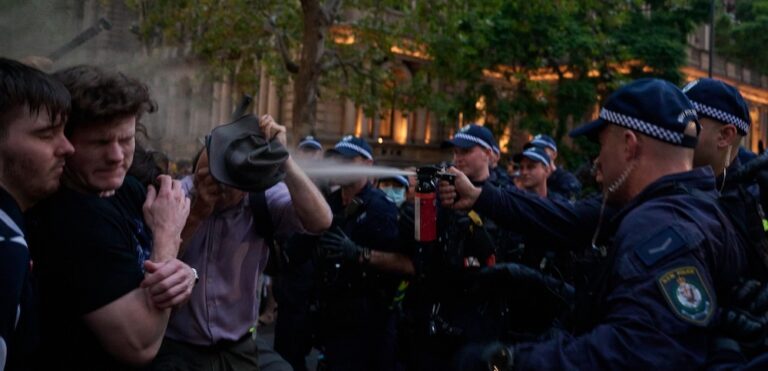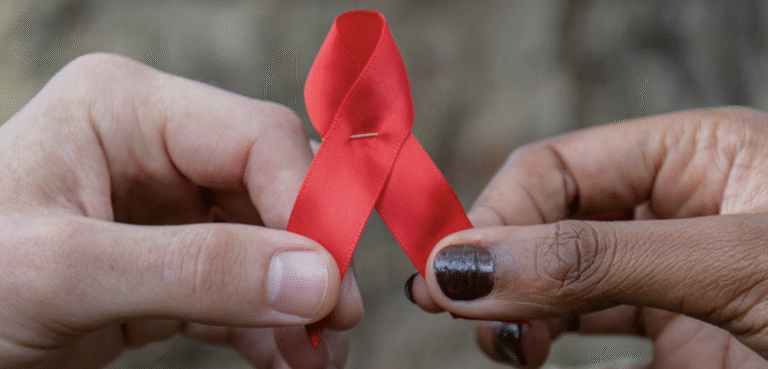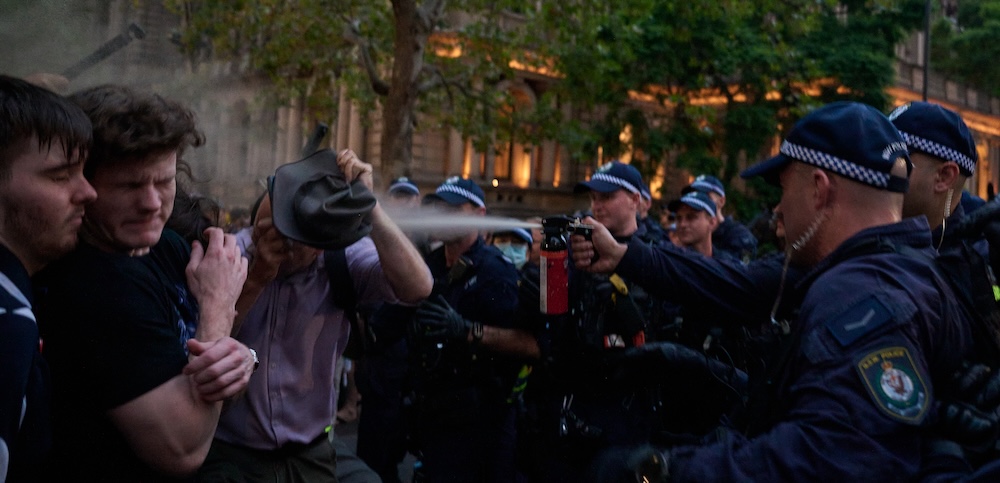
2GB’s Ray Hadley repeatedly makes false HIV biting, saliva risk claims

2GB talk radio host Ray Hadley has repeatedly implied that a person could be infected with a blood-borne virus like HIV if they were spat on or bitten in a radio segment that aired yesterday following an interview with NSW Opposition leader Jodi McKay in which she announced that Labor would be moving legislation to allow people accused of assaulting emergency service workers to be forcibly blood tested.
“Just say for instance a police officer, an ambulance officer, someone in health services gets spat on in the face, gets bitten, well obviously, they live for the next six months until testing can clear them with the fear that they’ve contracted some disease from the person inflicting the bite or spitting in their face,” Hadley incorrectly claimed.
“Well the legislation Jodi is promoting is that, immediately if that happens, if there’s an act of violence against one of these people – police officers, ambulance officers, or healthcare workers, the person inflicting the bite or spitting at them must immediately be tested, so that there is some surety for the person who has been spat at or bitten, either a police officer or an ambulance officer, whatever it is, can be told within a very short space of time, “oh that persons not got a problem or that person does have a problem, you could have a problem” so that they can start treatment if they require it.”
Hadley went on to imply that a person who was infected with a blood-borne virus such as HIV would be putting their children at risk of infection if they showed normal parental affection towards them.
“In the past what has happened, and what is happening today, is if an officer goes out tonight in NSW and … he or she gets bitten by some grub they’re trying to arrest, and the grub won’t consent, and isn’t forced to have a blood test, well the officer for the next six months can’t have a normal relationship with their partner, male or female, can’t have a normal relationship with their children, an affectionate relationship with their children in the normal sense, until they find out in six months time that they haven’t contracted some disease from the person that inflicted the bite or the spit,” Hadley incorrectly claimed.
“And I for the life of me can’t understand why the government, successive governments haven’t acted. Well the ball is now back in the court of the Attorney General Mark Speakman.
“Here is an offer from the Opposition to work with them to put in place legislation that will protect police officers, ambulance officers and other frontline services and I can’t think of one reason why the government would not agree with the Opposition that this must be done sooner rather than later.”
This week the NSW Labor Opposition signalled that it will introduce a bill which would allow the police to forcibly blood test arrested persons for HIV and other blood-borne viruses if they are accused of assaulting police officers.
NSW Labor announced the policy as part of its ‘Respect Our Cops’ campaign and says it will give notice to introduce a bill in the NSW Parliament “at the earliest possible opportunity” though the legislation would not be voted on before next year.
The policy would be triggered if the transfer of bodily fluids took place during the course of an alleged assault, and it is determined that there is a risk of infection.
In a statement to the media, NSW Labor Leader Jodi McKay said more can be done to support police officers and frontline workers.
“If we can give a police officer or others on the frontline peace of mind that they are not infected then I am all for that. They put themselves in harm’s way for us every day, the very least that government can do is give them some certainty over the risk of infection from blood-borne diseases,” McKay said.
“Other states have similar laws – it is high time that NSW followed suit. Many police officers have spoken out on this and called for a change in the law.”
In response, NSW’s leading HIV organisation, ACON, has condemned moves by NSW Labor to enforce mandatory testing.
In the lead up to the NSW state election in March 2019, ACON canvassed major parties on whether they opposed mandatory testing and NSW Labor affirmed their opposition, adding “we have no plans to change the current law”.
“Mandatory testing is a confused and poorly regulated policy in some other jurisdictions, is not based on any evidence of occupational transmission of disease, is rejected by the NSW Australian Medical Association as ineffective, and it represents a broken election promise,” ACON CEO Nicolas Parkhill said.

“This move undermines a clear process the NSW Government has undertaken to receive and assess submissions on this issue following the distribution of the Department of Justice Options Paper in 2018. This Options Paper was circulated in response to a 2017 NSW Parliamentary Committee Inquiry into violence against emergency services personnel. The NSW Government has yet to respond to this Options Paper.”
ACON has been in an ongoing contact with relevant NSW government departments and members of the NSW Parliament regarding the issue of mandatory testing – most recently when, in partnership with the Australasian Society for HIV Medicine, the Australian Federation of AIDS Organisations (AFAO) and six other leading HIV and blood-borne virus (BBV) organisations, it put forward a policy position paper in October 2018.
“We strongly believe in the importance of the well-being and safety of emergency service personnel. We agree they must be protected as much as is reasonably possible in a high-level occupational risk environment,” Parkhill said.
“However, there are other ways to manage anxiety and risks for BBVs, rather than resorting to legislation that gives police the power to mandatorily test alleged offenders – which is an approach that goes against expert advice, lacks an evidence base and relies on 30-year old notions of HIV and other BBVs.
“Punitive laws based on outdated misconceptions and myths about how HIV and other BBVs are transmitted, and which perpetuate stigma and discrimination, do not need to be introduced during a time when HIV notifications are at historic lows in NSW, when HIV is a treatable and manageable condition, and when inroads are being made into ending HIV stigma.
“NSW Labor’s proposal has no basis in medical evidence. Further, BBVs have a varied and at times extended window period for the detection of a transmission and as such, testing the source of exposure is not an effective method for gaining ‘peace of mind’ of one’s own test results.”
Parkhill said advances in prevention and treatment of HIV mean that police have access to treatments that effectively prevent the transmission of HIV, and these treatments are prescribed by doctors who are trained in identifying potential risk.
“Furthermore, these planned laws will run the risk of violating best-practice testing guidelines. The recent report compiled by the National Association of People Living with HIV/AIDS released in September 2019, The System Is Broken, highlights the complexity of introducing mandatory testing laws and the discrepancies between these laws in Australian jurisdictions,” Parkhill said.
“The report highlights that advances in prevention and treatment of HIV mean that transmission of the virus is extremely unlikely, noting that there have been no occupational transmissions in Australia for 17 years. The report also mentions that the implementation of such laws does not reduce the risk of transmission or affect the treatment pathway for individuals who may be exposed to HIV, and that in some cases, decisions relating to transmission risk are made by non-experts.
“NSW Labor’s move also goes against a policy position of the NSW Australian Medical Association which states: ‘Universal compulsory testing…cannot be justified on epidemiological or other public health grounds.’
“Mandatory testing would violate state and national guidelines that indicate testing should be voluntary except in exceptional circumstances. Given that saliva is not considered a risk for BBV, this act would not cross the threshold for mandatory testing under current policy settings in Australia.
“Mandatory disease testing of individuals infringes on the human rights of individuals, and increases community stigmatisation of people living with HIV, Hepatitis B and C.
“We strongly urge the Opposition Leader and NSW Labor to reconsider the introduction of testing laws as it has the potential to further exacerbate stigma and discrimination not only of people living with HIV, but also marginalised populations including people living with mental illness, Aboriginal and Torres Strait Islander peoples, people who are homeless, people from culturally and linguistically diverse backgrounds, sex workers and people who use drugs – communities that already face disproportionate discrimination on the basis of these attributes.
“We would welcome the opportunity to discuss this issue and its related medical and policy context with the NSW Opposition Leader, as she has done with the NSW Police Association and Health Services Union.”











And that is why people Labor is never ever to be electable at both a federal and state level again and that is just the ALDI bag money specials! I was once a Labor supporter, but when I turned 30 – I grew some sense and became a libertarian. It seems to me Labor have completely forgotten their LGBTI equality platform and working class recognition. Those days are long gone forever.
– Gay Libertarian Paul Mitchell
Ray Hadley is well known for misrepresenting and simply bullshitting about science. So there’s that.
The Australian Labor Party should know better. Shame.